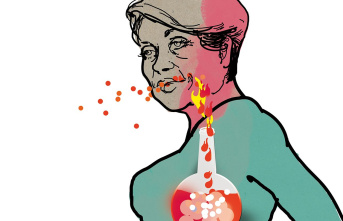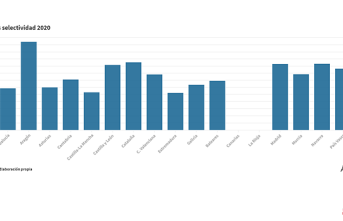Ignacio García Magarzo, general director of the business association Asedas (Mercadona, Lidl, Dia, SalvaMas or Consum) is especially concerned about the impact of inflation on the spending habits of Spanish consumers and their response to rising prices. In an interview with ABC, García Magarzo also warns about the repercussion on the income statements of the increase in energy prices, an item that already puts the future viability of companies in the distribution sector at risk.
From the sector you speak of an "unprecedented situation", how does this perfect storm affect your companies?
The margins in the distribution are very narrow and everything is calculated to the millimeter so that the business is profitable. There are companies that are seeing their income statements and their ability to be sustainable threatened by energy costs.
We have a very serious cost problem that we cannot deal with alone.
Have you noticed changes in consumer behavior due to high inflation?
Yes, changes in consumer behavior are beginning to be perceived. We still do not know how deep these changes will be, they are very subtle because the demand for food is not very elastic: everyone eats, although it can be eaten in a different way. We have been observing for a few weeks now that consumers are beginning to substitute higher value products for lower priced ones; this is very significant.
With the circumstances caused by the rise in the cost of raw materials and the accelerator that the war implies, the situation is very worrying. We are very clear about the five urgent measures that are needed in the face of the multifactorial crisis that we are facing.
The prices of some supermarket chains have risen an average of 10% in a year, is the shopping basket going to continue to get more expensive?
The IPC began to rise in September and has been increasing its increases until today. The shopping basket has always been below the general CPI, which means that this sector is containing its price increases and is not proving inflationary. On the other hand, the CPI started rising much later than commodities and energy; this indicates that there was an offset or contention. This trend continues as companies try to contain increases by charging their margins or by negotiating with suppliers. In any case, Spain continues to have some of the lowest food prices in Europe.
So, are the final sale prices going to continue to rise?
I cannot answer, nor should I, this question out of strict respect for Competition Law. What I can say is that we have not seen any relief in energy or raw material costs; Now alternative supplies to those that came from Ukraine arrive but at very high prices. We have information on how prices rise at origin, industrial prices and retail prices. The conclusion is that retail prices rise less than industrial and home prices. That is, the balance is beneficial to the consumer. But, our companies, in addition to being responsible, have to be sustainable and competitive, which means fighting not to lose customers. That is what they have always done and what they will continue to do.
What scenario do you have planned in Asedas for a few months?
We can only say how we are going to act. We are going to continue trying to ensure that the consumer receives the impact on prices as little as possible and as late as possible. We are going to continue to contain prices, since it is a sector that continues to grow, there are still investments and no one is going to let customers be robbed. Competition forces us to do so.
What measures can the Government approve to try to boost consumption or, at least, not stop it?
We ask the Government to lower indirect taxes that penalize consumption such as VAT or fluorinated gases. We also demand that the plastic tax be suspended for at least one more year and several more that were in the portfolio and that the Ministry of Finance and Ecological Transition have prepared.
The next measure should focus on making decisions on access to energy, which allow sectors like ours to have a greater capacity to access supplies in better conditions. The same must also be done with fuels and guarantee that we do not have transport problems again. And, in any case, ensure that it is safe. Although 95% of the products are of national origin, there is also work to be done so that Spain produces products that it used to import, but this does not depend only on the Government.
Will we see a shortage of products derived from cereals or sunflowers in the coming months on the shelves due to the war on European soil?
This must be asked of the industry, but the perception we have today is that measures are being taken and that alternative markets are being sought. We do not see any risk of product shortages. What we do visualize is that the costs are going to be high. There is product, but it is expensive. If in a few months the situation stabilizes, the costs may stabilize, but right now, it is a serious problem for the entire chain.
Has the supply chain recovered after the weeks of transport stoppage?
It depends on the area of Spain and the product. There were places that were particularly affected, such as fresh products in Andalusia, which have recovered more quickly, especially in the case of fresh products. There are more problems with some industrial products, such as dairy products, whose supply has not yet been normalized. The most important thing is that people understand that the products are collected or manufactured and arrive in stores in just 24 hours. The products are not accumulated anywhere or stored, because it is very expensive to do so. The chain allows all this to be done very quickly and saves on costs, but it is necessary to ensure the circulation of transport.
It must be remembered that the supply of products was interrupted for up to 12 days in some cases and that has not yet been recovered. The lack of supply paralyzed production and it has not yet fully returned to normal. The total cost that was generated has not yet been quantified, but we will and, in any case, it was very high.
The pending account of the sector in Spain is concentration. Given this high competitiveness in an environment of rising prices, is Spain still an attractive place for the big brands? If the price problem continues over time, will it end up causing some brands to decide to merge or sell?
It is always said that the least concentration in our country can lead to a process as a result of competition. We have already experienced other crises, such as that of 2008-2014, which was the most serious crisis that the country has experienced in terms of consumption in its entire history. There were months in 2009 in which food sales fell by 9% and at that time there was already talk that the regional chains were not going to be able to be competitive. However, regional chains are, in both cases, the most efficient and competitive thanks to their cost and logistics structure, but also because of their proximity to the consumer.
The regional chains are leaders in some of the areas in which they operate and, in addition, they are grouped into purchasing centers, with which they can buy at prices as competitive as the larger chains. On the other hand, these chains have more flexibility than other larger ones, which have more problems changing the assortment and substituting products on the shelves based on demand.
How is the sector adapting to the new Transport Law? Are the teams already adapting to the ban on driver participation in loading and unloading that will come into force in September?
We are very concerned about the impact of this regulation on the chain as a whole and, specifically, on our companies. We did not agree that we were excluded from the negotiations and the debate that took place between transportation and the Government last December and that gave rise to the regulation of that decree law that changes the Land Transportation Law. We were excluded from the meetings, it seems to us that it was a mistake and above all, social peace was not brought to the sector. On the contrary, it provoked confrontations and mobilizations with serious damage and for this reason it seems even more necessary to have participated.
Regarding other issues, such as the unloading in the store provided for in the decree law as an exception, we are waiting for the ministry's rule to be able to assess whether it poses any problem, of course, it will pose a cost problem in the chain.
Any other point that you find problematic?
The transport sector is demanding a regulation of its prices that prevents them from falling below production costs, that is, similar to those of the Food Chain Law. However, carriers are guaranteed to update prices based on fuel, which is their main cost. We are trying to see what impact this regulation is going to have on contracts and on the sector. We have not felt listened to and we think that part of this regulation is going to pose problems for the sector, the authorities know it and the carriers also know it.
Returning to changes in consumer habits? Does consumption of distribution brand rise? Has its price skyrocketed in recent weeks?
This stance is oversimplifying, as private label brands have enormous variety in their price, quality, and quality-to-price positioning. Most of these brands try to make a good proposal between quality and price that serves to build loyalty. They are actually ways of agreeing with the manufacturer on how we present a product to the consumer because store brands are also produced by manufacturers.
In short, there is a more complex reality: there may be distribution brands that are going up and others that are going down. In addition, manufacturer brands also make moves to position themselves in price. At the same time, private label bases one of its attributes on containing costs because it avoids some such as marketing or advertising.
From Promarca they criticize some of their associated supermarkets for not referencing the innovations of the manufacturer's brands.
According to this approach, which I think is not shared by most manufacturers, they are the ones who have to decide which products are on the shelves. But one of the main functions of distributors towards society is precisely to select products. In Spain, if we refer only to packaged products, there are approximately 460,000 products. All distributors select products and, therefore, we do not accept that there are manufacturers that have more right to be on the shelf than others. For example, an SME in Granada that manufactures dairy products has the same right to be on a supermarket shelf as a multinational. Distributors cannot afford not to have something that is truly innovative and the consumer needs and, on the other hand, they cannot afford to have something that is not and takes up space. On the other hand, affirming that the big brands are the ones that innovate and that the distribution brands do not is absolutely false. For all these reasons, we believe that this debate on innovation is not properly planted from those positions that you mention.
They also criticize that distribution brands copy the new products that manufacturers launch.
Industrial property is fundamental in the market. If certain manufacturers consider that the values and attributes of their products are being violated or someone is benefiting, they must resort to industrial property laws, the Spanish Patent and Trademark Office, the Commercial Courts and the lawyers who are dedicated to that We must also ask ourselves if there are more problems of infringement of industrial property between manufacturer brands and distribution brands or between the manufacturer brands themselves. In any case, that is what the laws are for: to guarantee that no one violates the property of others.
2












